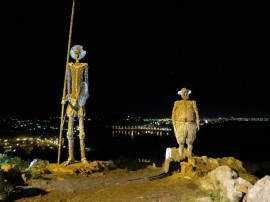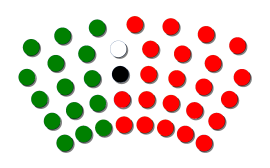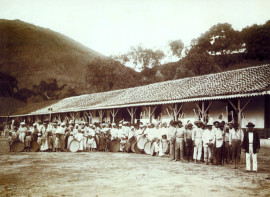
Abstract:I present a dynamic model of the U.S. economy with trade, labor mobility, endogenous growth and realistic geography to examine the relationship between spatial frictions, city formation and aggregate development. In the model, a subset of locations endogenously specialize in innovative industries that are subject to economies of scale. This leads to the formation and…
- Fecha(s): 16/05/2019
- Lugar: Seminario del Departamento de Métodos Cuantitativos para la Economía y Empresa, UMU. Retransmisión en directo.
- Ponente: María Victoria Caballero. Universidad de Murcia

Atrial fibrillation (AF) is an abnormal rhythm of the heart that is felt as an irregular heartbeat or pulse. This disease is the most common sustained cardiac arrhythmia and increases the risk of heart failure and other heart complications. Paroxysmal AF (PAF) is defined as an intermittent AF that terminates spontaneously o with intervention in…
- Fecha(s): 10/05/2019
- Lugar: Seminario del Departamento de Métodos Cuantitativos para la Economía y Empresa, UMU. Retransmisión en directo.
- Ponente: Santiago Rubio. Universidad de Valencia

Abstract: This paper studies the impact of adaptation on the stability of an international emission agreement. To address this issue we solve a three-stage coalition formation game where in the first stage countries decide whether or not to sign the agreement. Then, in the second stage, signatories (playing together) and non-signatories (playing individually) select their…
- Fecha(s): 09/05/2019
- Lugar: Seminario del Departamento de Economía Aplicada. Retransmitido en directo.
- Ponente: Eva Trescastro López (Universidad de Alicante)

Abstract El objetivo de este trabajo es profundizar en el impacto que tuvo la expansión minera sobre los niveles de vida de la población de Rio Tinto durante el primer tercio del siglo XX, en concreto sobre la alimentación y el estado nutritivo, así como su relación con la aparición de otras patologías asociadas a…
- Fecha(s): 04/04/2019
- Lugar: Seminario del Departamento de Métodos Cuantitativos para la Economía y Empresa, UMU. Retransmisión en directo.
- Ponente: Francisco Cabo. Universidad de Valladolid

The paper analyzes the interaction between individuals belonging to two distinct populations, who share the same strategy set but differ in their payoff matrices. A two-population evolutionary game describes this interaction, that presents a double dimension. On the one hand, agents in one population play a game against individuals within their own and also the…
- Fecha(s): 05/04/2019
- Lugar: Aula Martínez Gallur
- Ponente: José Carlos González Pimienta (Universidad Carlos 3 de Madrid)

We test the turnout predictions of the canonical costly voting model through a large-scale, real effort experiment. We recruit 1,200 participants through Amazon’s Mechanical Turk and employ a 2 x 2 between subjects design encompassing small ( N = 30) and large ( N = 300) elections, as well as close and lopsided. As predicted,…

Using an ideal setting from a major food safety crisis, we estimate a full demand model for the unsafe product and its substitutes and recover consumers’ preference parameters. Counterfactual exercises quantify the relevance of different mechanisms –changes in safety perceptions, idiosyncratic tastes, nutritional characteristics, and prices–driving consumers’ response. We find that consumers’ reaction is limited…
- Fecha(s): 21/03/2019
- Lugar: Seminario del departamento de Economía aplicada. Retransmitido en directo.
- Ponente: David Jiménez (U. Alicante)

Abstract: Nudges, which are interventions that do not restrict choice, have become widespread in policy applications. I develop a general and tractable framework to analyze the welfare implications of nudges. In this framework, individuals suffer from internalities (their utility when choosing is different from their welfare-determining utility) and choice and welfare depend on the environment,…
- Fecha(s): 14/03/2019
- Lugar: Seminario del Departamento de Economía Aplicada. Retransmitido en directo.
- Ponente: Daniel Gallardo-Albarrán (University of Groningen)

Abstract Few topics in economic history have received more attention than the profound transformations undergone by Great Britain during the 18th and 19th century. Even though the positive outcomes of this process for human living standards nowadays are not disputed, the same does not apply to the century spanning from 1750 to 1850 in Great…
- Fecha(s): 07/03/2019
- Lugar: Seminario del Departamento de Economía Aplicada. Retransmitido en directo.
- Ponente: Luiz Fernando Saraiva y Rita Almico (Universidade Federal Fluminense/Brasil)

Abstract La investigación busca interpretar el proceso de crecimiento de la economía brasileña de la mitad del siglo XIX y principios del siglo XX reconociendo la importancia fundamental que el trabajo esclavo y los seres humanos esclavizados tuvieron en ese proceso. Utilizando datos estadísticos y demográficos, intentamos demostrar la estrecha y difícil relación entre esclavitud…











